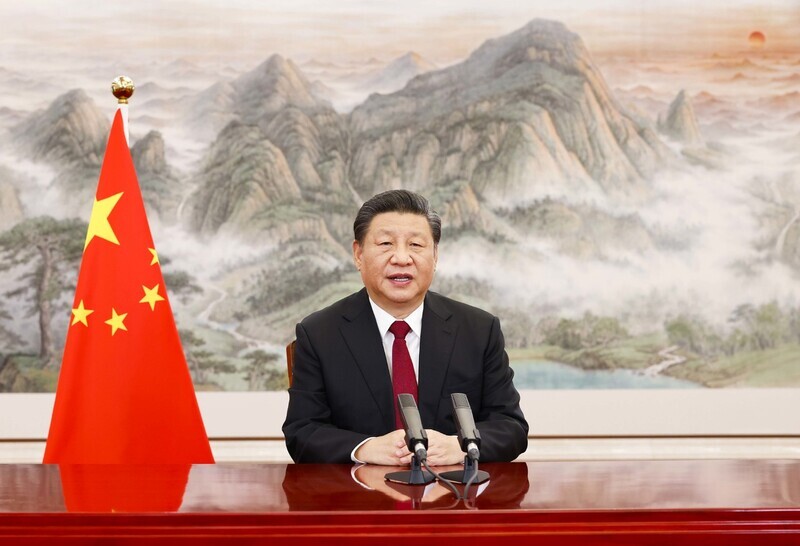hankyoreh
Links to other country sites 다른 나라 사이트 링크
China’s “common prosperity” not enough to remedy inequality, Korea’s central bank finds

Though the Chinese government began a push for “common prosperity” to remedy worsening economic inequality within its borders, closing the gap between the wealthy and the poor will not be easy, the Bank of Korea (BOK) projected.
In its world economy periodical released Sunday, the BOK stated that “although serious income inequality within the Chinese economy is an urgent problem that must be resolved from the Chinese government’s standpoint as it can threaten the legitimacy and stability of the country’s political system, redistribution policies will not be easy to institute smoothly.”
The Chinese government previously announced “common prosperity” as its medium- to long-term policy goal last year, stating it would strengthen its redistribution policies. According to the BOK, as China went through the process of reform and opening up its markets, economic development in the country centered around Eastern coastal cities, leading to a widening of the income gap between urban and rural areas and regional income disparities.
For instance, the per capita disposable income for urban households was 2.6 times that of rural households in 2020. The hukou household registration system, which restricts residential relocation in order to prevent the sharp inflow of rural migrants to urban areas, is exacerbating the divide. For example, individuals who reside in areas other than where they are registered in the hukou system enjoy limited social welfare benefits and opportunities for homeownership.
Meanwhile, China’s current income redistribution system is wholly inadequate. According to the BOK’s periodical, “Out of all Chinese government expenditures in 2018, the percentage of health care and social welfare expenses was only 35%, much lower than that of the US (45%), Germany (60%), and Japan (62%).”
Though the Chinese government belatedly made haste to solve inequality last year, the process will not be easy. For one, China’s economy is slowing in growth. With its yearly economic growth rate projected to drop to 5% this year from 8.1% last year, it will be difficult for China to make bold policy decisions that prioritize redistribution over growth with economic revitalization in mind.
In order to prevent further drops in economic growth, fiscal spending will be necessary, and with limited options to increase tax revenue, funds for redistribution will be in short supply. Moreover, the economic divide between rural and urban areas, the hukou system, and other issues of inequality are structural and institutional problems that accumulated over the course of the Communist Party’s consolidation of internal unity, so redistribution policies alone may not resolve them.
The BOK concluded, “With China’s economic growth expected to slow and considering anticipated rough goings in increasing tax revenue, uncertain corporate conditions, and the difficulty of reducing disparities between groups, it will not be easy for the Chinese government to institute redistribution policies smoothly.”
By Jun Seul-gi, staff reporter
Please direct questions or comments to [english@hani.co.kr]

Editorial・opinion
![[Column] Park Geun-hye déjà vu in Yoon Suk-yeol [Column] Park Geun-hye déjà vu in Yoon Suk-yeol](https://flexible.img.hani.co.kr/flexible/normal/500/300/imgdb/original/2024/0424/651713945113788.jpg) [Column] Park Geun-hye déjà vu in Yoon Suk-yeol
[Column] Park Geun-hye déjà vu in Yoon Suk-yeol![[Editorial] New weight of N. Korea’s nuclear threats makes dialogue all the more urgent [Editorial] New weight of N. Korea’s nuclear threats makes dialogue all the more urgent](https://flexible.img.hani.co.kr/flexible/normal/500/300/imgdb/original/2024/0424/7317139454662664.jpg) [Editorial] New weight of N. Korea’s nuclear threats makes dialogue all the more urgent
[Editorial] New weight of N. Korea’s nuclear threats makes dialogue all the more urgent- [Guest essay] The real reason Korea’s new right wants to dub Rhee a founding father
- [Column] ‘Choson’: Is it time we start referring to N. Korea in its own terms?
- [Editorial] Japan’s rewriting of history with Korea has gone too far
- [Column] The president’s questionable capacity for dialogue
- [Column] Are chaebol firms just pizza pies for families to divvy up as they please?
- [Column] Has Korea, too, crossed the Rubicon on China?
- [Correspondent’s column] In Japan’s alliance with US, echoes of its past alliances with UK
- [Editorial] Does Yoon think the Korean public is wrong?
Most viewed articles
- 1‘We must say no’: Seoul defense chief on Korean, USFK involvement in hypothetical Taiwan crisis
- 2N. Korean delegation’s trip to Iran shows how Pyongyang is leveraging ties with Moscow
- 346% of cases of violence against women in Korea perpetrated by intimate partner, study finds
- 4[Column] Park Geun-hye déjà vu in Yoon Suk-yeol
- 5‘Weddingflation’ breaks the bank for Korean couples-to-be
- 6Will NewJeans end up collateral damage in internal feud at K-pop juggernaut Hybe?
- 7Amnesty notes ‘erosion’ of freedom of expression in Korea in annual human rights report
- 8[Interview] Dear Korean men, It’s OK to admit you’re not always strong
- 9Korean government’s compromise plan for medical reform swiftly rejected by doctors
- 10[Editorial] Japan’s rewriting of history with Korea has gone too far